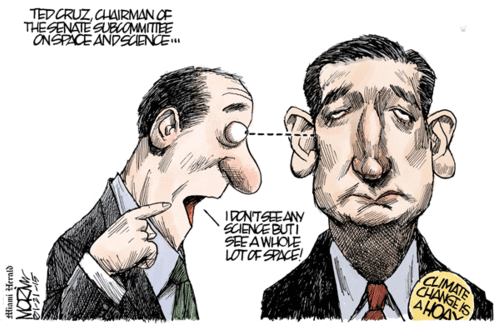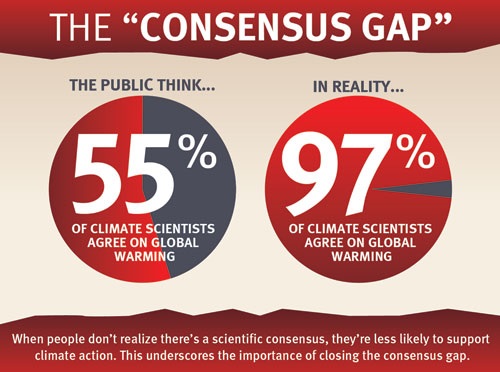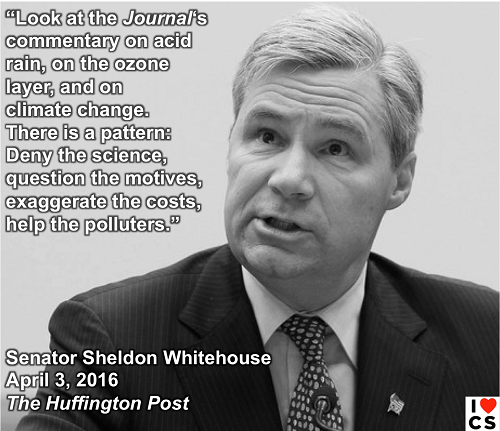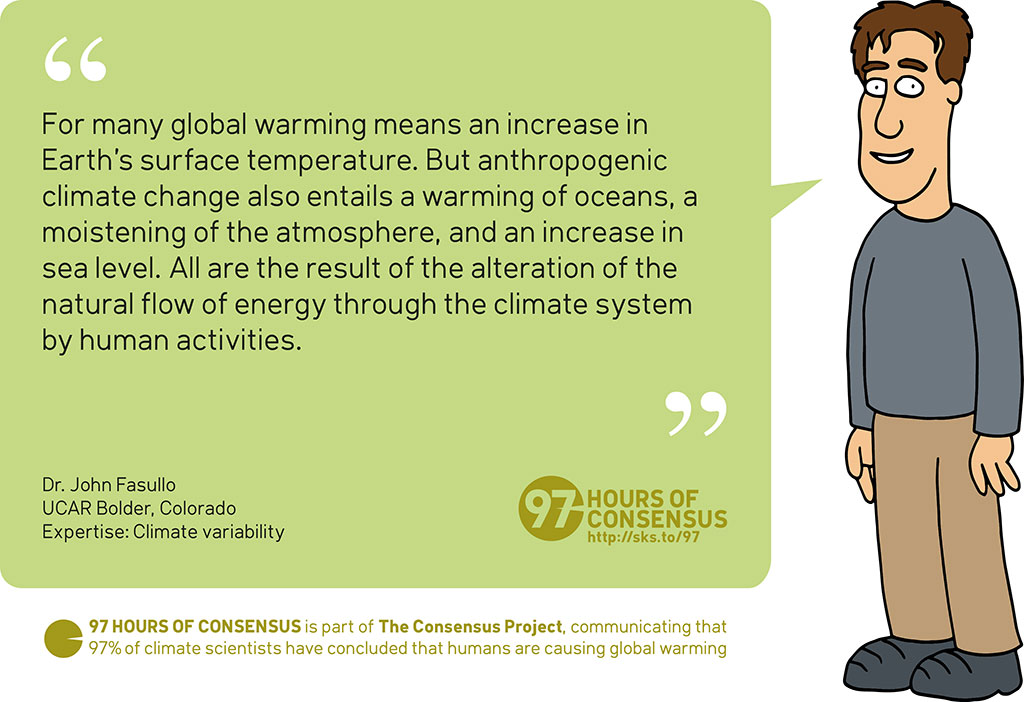2016 SkS Weekly Digest #15
Posted on 10 April 2016 by John Hartz
SkS Highlights... El Niño Impacts... Toon of the Week... Quote of the Week... SkS in the News... SkS Spotlights... Coming Soon on SkS... Poster of the Week... SkS Week in Review... 97 Hours of Consensus...
SkS Highlights
To meet the Paris climate goals, do we need to engineer the climate? by Simon Nicholson & drew the highest number of comments of the articles posted on SkS during the past week. After COP21: 7 Key Tasks to Implement the Paris Agreement by Eliza Northrop (World Resources Institute) attracted the second highest number.
El Niño to La Niña
Back in November, El Niño reached a fever pitch, vaulting into the ranks of the strongest events on record and wreaking havoc on weather patterns around the world. Now it is beginning to wane as the ocean cools, so what comes next?
It’s possible that by next fall, the tropical Pacific Ocean could seesaw into a state that is roughly El Niño’s opposite, forecasters say. Called La Niña, this climate state comes with its own set of global impacts, including higher chances of a dry winter in drought-plagued California and warm, wet weather in Southeast Asia.
Will La Niña Follow One of the Strongest Ever El Niños? by Andrea Thompson, Climate Central, Apr 8, 2016
Toon of the Week

Hat tip to What on Earth? comics
Quote of the Week
“In science, the word theory isn’t applied lightly,” Kenneth R. Miller, a cell biologist at Brown University, said. “It doesn’t mean a hunch or a guess. A theory is a system of explanations that ties together a whole bunch of facts. It not only explains those facts, but predicts what you ought to find from other observations and experiments.”
In Science, It’s Never ‘Just a Theory’ by Carl Zimmer, Science, New York Times, Apr 8, 2016
SkS in the News
Second, the ongoing disinformation campaign funded by the fossil fuel industry (together with false balance by the media) has left the public with the impression that there is considerable scientific debate on a subject where there isn’t.

When people are informed about the reality of the overwhelming consensus they naturally are more inclined to want to take action, as social science research has shown.
One Fact About Climate Change That’s Worth Repeating by Joe Romm, Climate Progress, Apr 6, 2016
SkS Spotlights: InfluenceMap
Introduction
We are a neutral and independent UK-based non-profit whose remit is to map, analyze and score the extent to which corporations are influencing climate change policy. Our approach is driven by a desire to construct an objective and internally consistent assessment platform in a field that is inherently subjective and anecdotal in nature. Our platform is open to all and our method is fully transparent. We present comparative ratings of influence over the climate policy process, applied to the leading industrial corporations in the world. Our scores may also be regarded as a measure of a corporation's readiness in the case of a shift towards a low carbon regulatory regime, based on the assumption that their support for this originates from a forward-thinking competitive strategy.
Our Mission
InfluenceMap is driven by a desire to remove the political gridlock that has hindered the climate change issue since the Earth Summit in 1992, and has since prevented a meaningful global agreement. Whilst the current mood of sustainability-driven CEOs appears to be confident that business is rallying behind the path to appropriate action, policymakers are sceptical, suggesting corporate influence has, and continues to be, a major factor in holding back the policy process. We provide our stakeholders with an online tool to access information on this topic, supporting key engagers in their interactions with companies and corporate representatives. We point to and support the recommendations of a key report on corporate engagement with climate policy from three UN agencies entitled Caring for Climate. It states that corporations be transparent, align their political influences (internally and externally), support climate legislation, and to stop obstructing it.
Our Approach
- We bring together a range of reliable and clearly referenced data sources from which evidence of corporate influence on climate policy can be assessed.
- Our organization focuses on data aggregation, analysis and original research. We rely on the generous donation of time by our expert advisors in areas such as climate policy, corporate communications and sustainable investment.
- We are focused on creating an accessible and transparent tool to be used by individuals engaging with policymakers, the public sector and private sectors. Recognizing the need for current and accurate information, InfluenceMap is consistently updated, and the scores are adjusted accordingly.
- We intend to evolve our process based on feedback from stakeholders. We would be delighted if our platform could be applied to other areas of policy and legislation.
- Our funding is provided by individuals and organizations with an interest in our area of focus. We ensure there is no conflict of interest between our funding sources and the organizations we assess.
Coming Soon on SkS
- White House: Climate Change Poses Urgent Health Risk (Bobby Magill)
- James Powell is wrong about the 99.99% AGW consensus (Andy Skuce)
- Consensus on consensus (Dana)
- Handy resources when facing a firehose of falsehoods (Baerbel)
- Guest Post (John Abraham)
- 2016 SkS Weekly News Roundup #16 (John Hartz)
- 2016 SkS Weekly Digest #16 (John Hartz)
Poster of the Week

SkS Week in Review
- 2016 SkS Weekly News Roundup #15 by John Hartz
- The 35 countries cutting the link between economic growth and emissions by Multiple Authors (Carbaon Brief)
- Factcheck: Are climate models ‘wrong’ on rainfall extremes? by Robert Mc Sweeney (Carbon Brief)
- After COP21: 7 Key Tasks to Implement the Paris Agreement by Eliza Northrop (World Resources Institute)
- To meet the Paris climate goals, do we need to engineer the climate? by Simon Nicholson &
- The similarities between Trump support and climate denial by Dana Nucitelli (Climate Consensus - the 97%, Guardian)
- 2016 SkS Weekly Digest #14 by John Hartz
97 Hours of Consensus: John Fasullo

Quote derived with author's permission from:
"For many [global warming] means the global mean temperature increases. But for anthropogenic climate change, it means the climate change resulting from all kinds of human activities, and it is now well established that by far the biggest influence occurs from changes in atmospheric composition, which interfere with the natural flow of energy through the climate system."































 Arguments
Arguments






























The InfluenceMap deals with how corporations are adjusting their policies to cope with their perceptions of climate change. However, it does not take into account the demand for the goods or services provided by the corporations. Coping with climate change is only one of the predicaments society will have to deal with. A corporation may rate at F for its policies on claime change but an A for the impact of their policy on, for instance, food production.